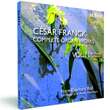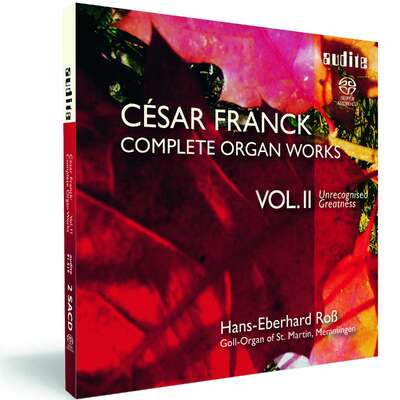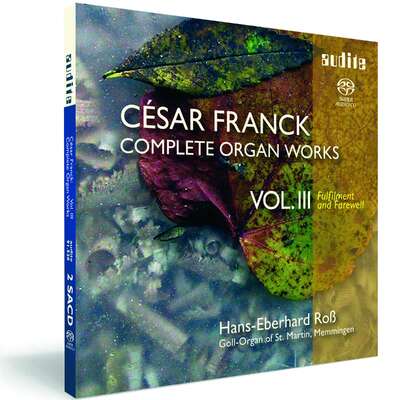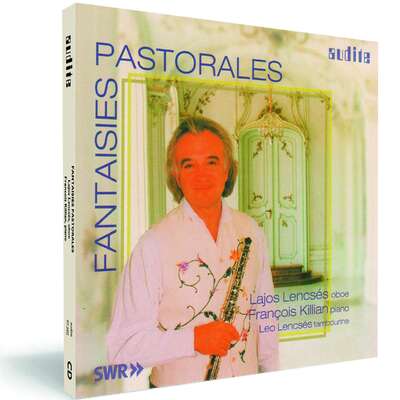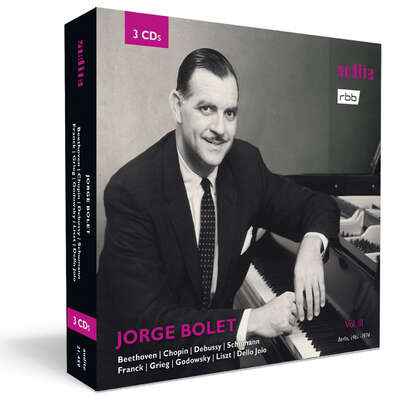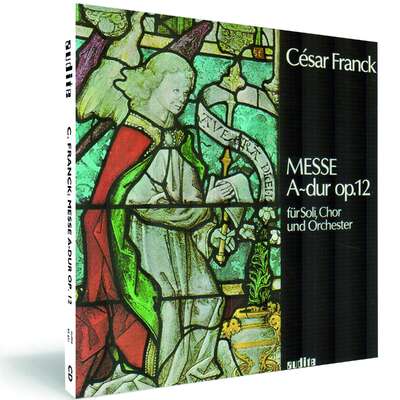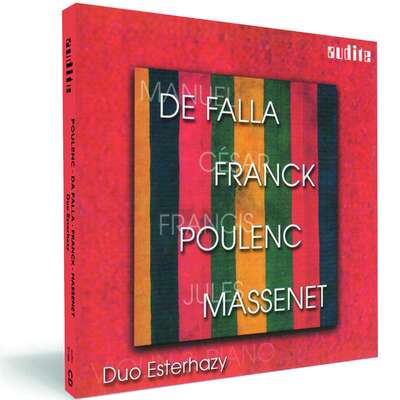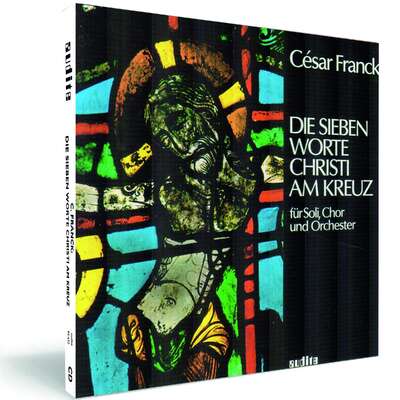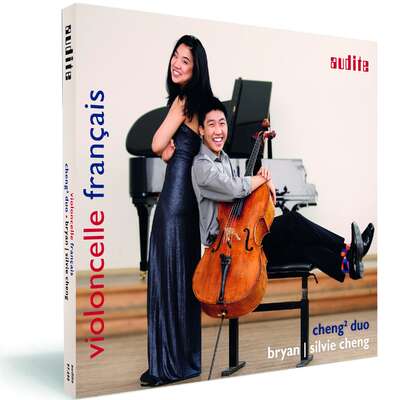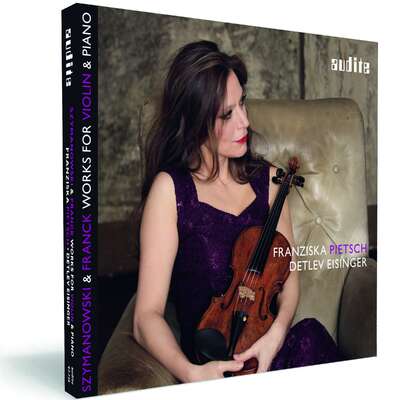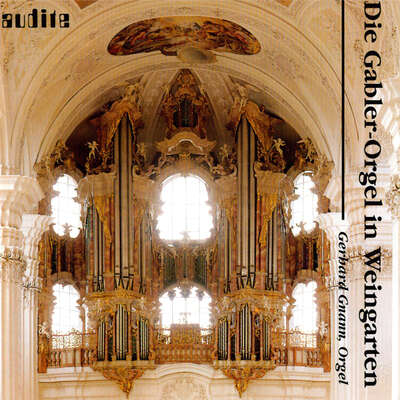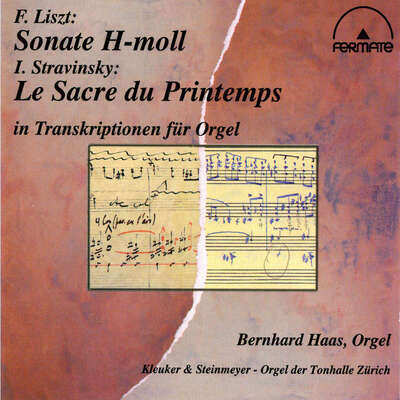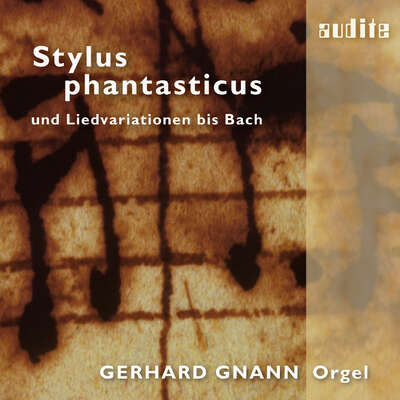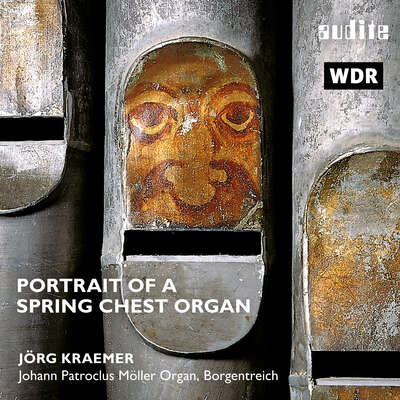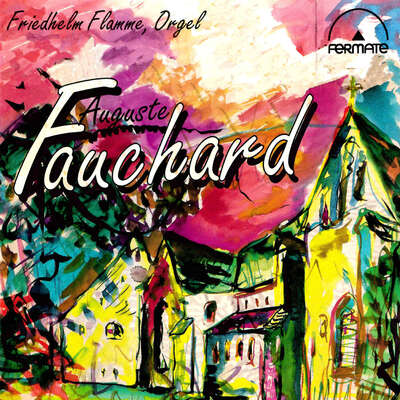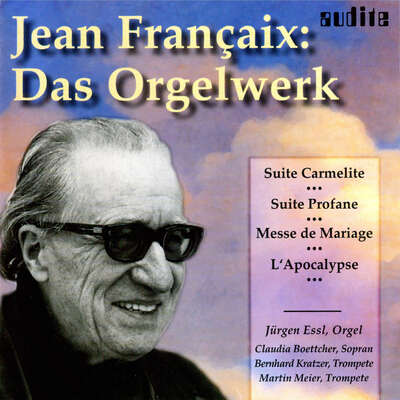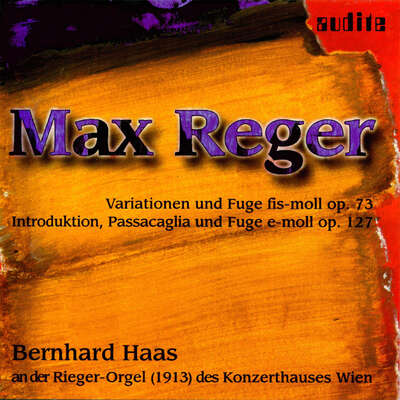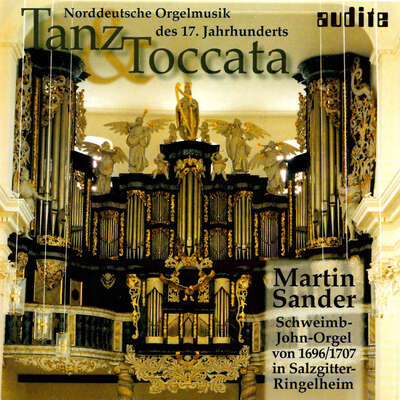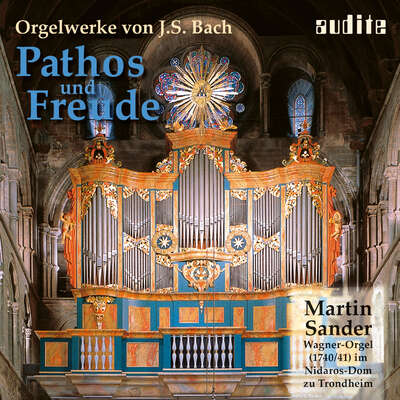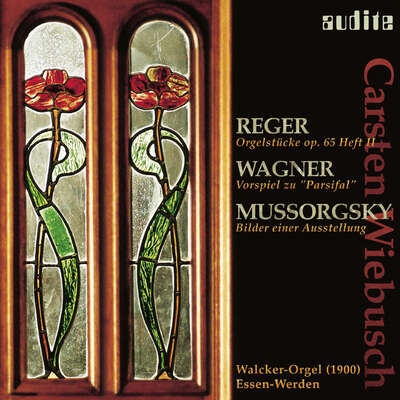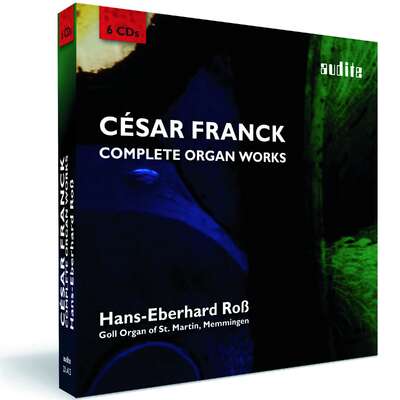
CÉSAR FRANCK : Complete Edition of Organ Works Vol. I “From Prodigy to Composer” This double SACD is the beginning of a series of 3 double SACDs which together present César Franck’s complete organ works for the first time. This complete edition naturally includes the 12 major...more
"One hesitates to use the word ‘great’ but in this case nothing else will do." (musicweb-international.com)
Track List
Details
| César Franck: Complete Organ Works Vol. I | |
| article number: | 91.518 |
|---|---|
| EAN barcode: | 4022143915184 |
| price group: | CV |
| release date: | 1. November 2005 |
| total time: | 146 min. |
Bonus Material
- Information about registration
- "C. Franck: Complete Organ Works" in de Orgelvriend
- Supersonic Award for "C. Franck: Complete Organ Works Vol. I"
-
Fascination Organ (part III)
documentation on the building of the Goll Organ in St. Martin, Memmingen
-
Fascination Organ (part IV)
documentation on the building of the Goll Organ in St. Martin, Memmingen
-
Fascination Organ (part V)
documentation on the building of the Goll Organ in St. Martin, Memmingen
-
Fascination Organ (part VI)
documentation on the building of the Goll Organ in St. Martin, Memmingen
Informationen
CÉSAR FRANCK : Complete Edition of Organ Works
Vol. I “From Prodigy to Composer”
This double SACD is the beginning of a series of 3 double SACDs which together present César Franck’s complete organ works for the first time. This complete edition naturally includes the 12 major well-known works of this composer. In addition to these, it contains at least 40 minutes of first recordings alongside many smaller treasures of the repertoire. The works for harmonium are available here in their entirety in their versions for organ, as are two organ works discovered during the 1970s and 1980s, also new to the recording medium.
Besides these aspects of completeness, the present complete production is marked by the special sound of the Goll Organ. Its warm, soft sound, resulting from widely constructed pipes, creates an unobtrusive power and fullness; the essence of the French Cavaillé Organs has been preserved and further developed in this instrument.
Hans-Eberhard Roß, Cantor of the Deanery St. Martin in Memmingen, was decisively and authoritatively involved in the planning and disposition of this organ.
Interested music lovers can find the exact registrations of all the pieces as special media file on the audite website, as well as short videos about the construction of the organ.
Reviews
www.musicweb-international.com | March 2008 | Dan Morgan | March 7, 2008
Take the cat off the hook and throw out the phone – you won’t want to be disturbed for the next two and a half hours. Why? Because this is anMehr lesen
This hybrid CD/SACD set is the first in Audite’s three-volume survey of Franck’s œuvre for organ, played by Hans-Eberhard Ross. A graduate of the Hochschule für Musik in Würzburg and now music director of St Martin, Ross has at his disposal the splendid Goll organ inaugurated in 1998. The Audite website has some interesting video clips on the instrument and its construction, which will surely be of interest to organ buffs.
As Martin Weyer points out in his detailed liner-notes ‘historically informed performance practice’ or HIPP – already familiar in orchestral and instrumental repertoire – has a parallel in organ music. In this case the Goll instrument was chosen because it has similar qualities to the Cavaillé-Coll organs Franck would have known, especially that of his last post at the Basilica Sainte Clotilde.
Franck devotees will know that he came to the organ relatively late in life and this collection begins with the Pièce en mi bémol, his earliest work for the instrument. At the time he was organist at the not very prestigious Notre Dame de Lorette, whose older Cavaillé-Coll probably accounts for this work’s limited colour palette. That said one is immediately struck by the heroic grandeur at the start and finish of the piece but even more so by the delicately-wrought writing in between.
The real star throughout is the Goll organ, which is simply astonishing in its purity and accuracy of tone, qualities the Audite engineers have captured to perfection. No audible clanks and wheezes, dodgy reeds or excessive reverberation here; indeed, this is one of the most satisfying organ discs I’ve heard in years. In its basic CD form it’s a fine recording, full and clear, but in SACD the music sounds even more clean-limbed and well articulated, the quieter passages luminously beautiful.
The Pièce pour Grand Orgue and the G minor Andantino have a new-found rhythmic vitality that Ross conveys with considerable grace and skill. In the former that marvellous section beginning at 2:10 where the notes seem to hang suspended above a deep, steady pedal, not to mention the carillon-like figures at 6:40, are a joy to hear. And in the Andantino Ross adds remarkable poise and charm to his growing list of accomplishments. Surely this music has never sounded so airy and buoyant, the rhythms so naturally sprung? And have the final moments ever seemed so like a lingering farewell? A miraculous little piece, so perfectly shaped and characterised.
The gentle introduction to the C major Fantaisie, played here in the first of three versions, is another of those moments when it seems a veil has been lifted from the music, such is the startling realism of the recording. All three versions are included in this set but I much prefer the lighter, more ‘hear through’ quality of the first; that said the later versions retain much of the original’s magical melodies.
Franck’s pupil Louis Vierne arranged the Cinq Pièces – written for harmonium – yet the composer’s distinctive style is left intact. Indeed, apart from what Weyer describes as a few ‘careful alterations’ all Vierne needed to do was transcribe the music from two staves to three. And even though all the movements are essentially Andantes such is the range and shade of Franck’s colour palette that this never feels like too much of a good thing.
The remaining pieces on disc one – the brief little Offertoire in A major and the Quasi Marcia – are very similar; the first is light and ethereal and, despite its title, the second sounds even more so. The latter may be a transcription but Franck’s pealing melodies are just captivating, the whole piece a model of restraint and elegance.
This collection is subtitled ‘From Prodigy to Composer’ and disc two contains works that date from Franck’s tenure at Sainte Clotilde. It was an important appointment and one he was to hold until his death in 1890. The third (1868) version of the C major Fantaisie shows just how much Franck the composer had matured in two decades. Whichever version one might prefer they all share a limpid beauty and, at times, an understated majesty that’s hard to resist. Certainly the pedals of the Goll organ won’t shake the rafters but they do have thrilling weight and authority.
The Grande Pièce Symphonique is often trotted out in organ collections but I can’t remember it sounding quite so integrated or the harmonies so dark and velvety. Certainly there is an extra breadth and weight to the writing compared with Franck’s earlier works, and while there is less of that high loveliness Ross does manage to capture the score’s air of Gallic sophistication. As always the acoustic is a real advantage, with complex musical textures – so often blurred or bloated – sounding wonderfully crisp and coherent.
It’s easy to forget that Bach’s organ works – published in 1844 – were still a novelty, yet Franck’s Prélude, Fugue et Variation, with its endless stream of melodies above a stern but gentle bass line, is every bit as rewarding as Bach’s. A quick CD/SACD comparison at this point reveals extra bloom and nuance in the treble, with a sense of unlimited space above and around the notes. A reminder, if one were needed, of the format’s many sonic advantages.
The Op. 19 Pastorale comes across as one of the most delectable pieces on this extraordinary set. I simply cannot imagine this diaphanous score shaped with more finesse than here. Perhaps one could go so far as to characterise this as faerie music à la Franck, such is its lightness and charm.
Prière, dedicated to the composer’s erstwhile teacher François Benoist (1794-1878), isn’t particularly liturgical but it does have an air of solemnity to it. It may even seem a little dour after the playful Pastorale but the composer’s irrepressible lyricism is never too far away – just listen to that sublime tune that materialises at 5:52.
Scholarly, grave, even a little dry, Prière gives way to the extrovert Op. 21. As the finale to the Six Pièces and the set this shows Franck at his most Lisztian. The music veritably thunders and rolls around the church in a spectacular display of music-making. But even in such bravura pieces Ross retains a remarkable consistency of approach, favouring a subtle, self-effacing style of playing that suits this music so well.
This isn’t the first time the fabulous Goll organ has been committed to disc; Ross has recorded a mixed programme for IFO (IFO45), Ulfert Smidt has taped some Franck and Langlais for MDG (MDG 90614) and Jane Parker Smith plays an eclectic mix of pieces for Avie (AVI-34). I have yet to these but I’d be very surprised if they come even close to the sonic and musical splendour of this Audite release.
And of course there are two more instalments in this series – Audite 91.519 and 91.520 – which, if Volume I is anything to go by, must make this the finest and most satisfying survey now before the public. One hesitates to use the word ‘great’ but in this case nothing else will do.
France Catholique | N°3068, 20 Avril 2007 | François-Xavier Lacroux | April 20, 2007
Amours, Delices...
Musiques d'Orgues
La majesté des grandes orgues est l'expression de la splendeur de laMehr lesen
Audiophile Audition | September 2006 | John Sunier | September 5, 2006 First recorded collection of all the organ works by the founder of the organ symphony
This collection of three SACDs, available separately, claims to be theMehr lesen
opushd.net - opus haute définition e-magazine | numéro 12 | Jean-Jacques Millo | July 11, 2006
Avec les six pièces de 1863, les trois pièces de 1878 et les troisMehr lesen
Musica Sacra | Heft 4 - Juli/August 2006 | Guido Krawinkel | July 1, 2006
Eine Neuaufnahme der Orgelwerke von César Franck ist auch nicht geradeMehr lesen
American Record Guide | July/August 2006 | Gatens | July 1, 2006
Cesar Franck's reputation as a composer for the organ rests almost entirely on a mere 12 pieces: the Six Pieces published in 1868, the Three PiecesMehr lesen
The present set is Volume 1 of three (six discs in all) that set out to present “his complete organ works for the first time”. Several of the selections here are claimed as premiere recordings. That claim is made for the Piece in E-flat (1846) that opens the first disc of the set, but this was included on a program of Franck's Pièces Posthumes recorded by Joris Verdin and released in 1994 (Arion 68276; Sept/Oct 1995).
The first disc contains the early pieces. Perhaps the best known of these is the Andantino in G minor, published in 1857, and sometimes regarded almost as the 13th piece in the “canon”, though it is rather lightweight for that company. A quite substantial Piece pour Grand Orgue dates from 1854, but was not published until 1990. It is not claimed here as a premiere recording. A pleasant set of five miniatures for harmonium written around 1856 was arranged for pipe organ by Louis Vierne and published in 1864. An Offertory in A appeared in a collection of posthumous pieces published in 1905. The first disc concludes with a ‘Quasi Marcia’, Opus 22, originally for harmonium and arranged for pipe organ by Hans-Eberhard Ross, the organist for the series. These early pieces may not have the stature of the Twelve, but they are not without interest. It is possible to hear hints of the mature Franck in these early efforts, and I would say that lesser works by him are more worthy of attention than even the principal achievements of, say, an Edouard Batiste or a WT Best.
The other two items on disc 1 are preliminary versions of the Fantasy in C, Opus 16, from the Six Pieces. The first version, written in 1856, has the opening section of Opus 16, and this returns at the end as a slightly condensed recapitulation, but the intervening material is completely different. The second version, dating from 1863, has a new opening section, but the rest is essentially the same as Opus 16. There is yet another version written in 1868 – later than Opus 16 – and it appears in Volume 2 of the present series.
Disc 2 contains the Six Pieces. In general, Ross's playing is coherent and thoughtful, avoiding both rigidity and excessive self-indulgence. The program notes make much of tempo in the Grand Pièce Symphonique, Opus 17. A significant discovery in the 1990s was a printed copy of the Six Pieces with metronome markings handwritten by Franck himself. The tempos are all faster than anyone would have expected, and significantly faster than the interpretive traditions associated with Tournemire, Langlais, and Dupré. The notes claim that Ross is observing these authorial tempos. This is true of the fast tempos, but the slower sections are played substantially slower than Franck's markings indicate. The issue is not raised for any other of the Six Pieces, and as far as I am concerned, that is just as well. The rapid tempos certainly make for an exciting performance of Opus 17, though tempo alone will not guarantee real excitement. At the same time a great deal of musical detail is hopelessly lost in the lively reverberation of the room. This is also true of the Final, Opus 21. Here again Ross takes a blistering tempo.
The organ is the 1998 Goll in the church of St Martin, Memmingen. The tone is very dark, dense, and warm – a reasonable facsimile of the Cavaillé-Coll sound that Franck had in mind, complete with that special reedy snarl from full organ. By the end of the second disc, I was becoming very tired of the sound, and this may have more to do with the recording (and reverberation) than with the instrument itself. The tone is so intense that it sounds forced. The pedal especially seems too heavy and turgid for the ensemble.
There is much to admire here, but I am not yet ready to forsake my copy of Jeanne Demessieux's 1959 recording of the Twelve at La Madeleine.
Fono Forum | 6/2006 | Christoph Vratz | June 1, 2006 Sechs statt zwei
In drei Folgen – „Vom Wunderkind zum Komponisten“, „Verkannte Größe“, „Erfüllung und Abschied“ – wird uns, so verkündet es derMehr lesen
Hans-Eberhard Roß hat an der Goll-Orgel in Memmingen neben den Standardwerken auch jene teilweise posthum erschienenen Kompositionen eingespielt, die Franck für Orgel oder Harmonium geschrieben hat. Nichts Ungewöhnliches, da in Frankreich die Verwandtschaftsbeziehungen zwischen beiden Instrumenten weit enger ausgelegt wurden als etwa zur gleichen Zeit in Deutschland. So hat beispielsweise Louis Vierne Francks fünf Stücke von 1856 für Orgel transkribiert, ohne dafür grundlegend in den Notentext eingreifen zu müssen. Im Falle der „Pièces posthumes“, 1905 von Francks Sohn Georges herausgegeben, ist zwar die Wahl des Instruments freigestellt, doch es gibt gute Gründe anzunehmen, dass Franck die Orgel favorisiert habe. Die umfangreichste Sammlung für Orgel oder Harmonium, „L'Organiste I“, blieb unvollendet. Von den ursprünglich 100 Sätzen sind lediglich 63 überliefert. Nach Aussage von Francks Schüler d'Indy handelt es sich hierbei um Magnificat-Versetten, kleine liturgische Häppchen für den Vespergottesdienst – eine Behauptung, die in ihrer Absolutheit nicht ganz richtig sein dürfte.
Roß spielt diese, zwischen wenigen Sekunden und maximal fünf Minuten langen Stückchen mit penibler Dynamisierung und umsichtiger Registrierung. Jedes dieser Werke erhält dadurch einen eigenen Charakter. Roß nutzt sein feines Legato-Spiel, um aus einzelnen Tönen ein Gewebe aus Klängen zu bilden, die einander ergänzen und sich wechselseitig etwas mitzuteilen haben. Durch den Miniaturcharakter dieser Werke gewinnt der Hörer den Eindruck, als führe Roß eine Kamera: Auf ein zartes Andantino folgt unvermittelt ein plüschiges Maestoso, auf ein „Poco Allegro“ ein kurzes „Amen“ und ein gemächliches „Offertoire“. Dadurch fügen sich diese Einzelwerke zu kleinen Suiten.
Bei Francks großen Orgelwerken, den Chorälen, dem „Final“ oder der „Grande Pièce Symphonique“, fällt auf, dass Roß zügig unterwegs ist. Egal, ob man Olivier Latry (DG), Eric Lebrun (Naxos), Daniel Roth (Motette) oder Jean Guillou (Dorian) zum Vergleich heranzieht, stets wählt Roß die rascheren Tempi. Nun ließe sich dieser Befund damit begründen, dass die genannten Einspielungen allesamt an Cavaillé-Coll-Orgeln bzw. diesen nachempfundenen Instrumenten entstanden sind und dadurch per se andere Klangvoraussetzungen bieten. Im Booklet weist Martin Weyer auf das Problem der Wahl zwischen historischer Nähe und modernem Orgelbau hin: „Unter dem Deckmantel historischer Exaktheit hat sich ein neuer musikalischer Materialismus eingeschlichen, der den Interpreten zum Vollzugsbeamten des Instrumentenkundlers macht und seine Eigenverantwortung reduziert.“ Gern hätte man an dieser Stelle auch ein Wort des Künstlers gelesen und seine Einschätzung über das eher unbekannte Franck-Repertoire kennen gelernt.
Roß missbraucht seine Tempi nicht für virtuose Zwecke, ihm geht es nicht um ein Kräftemessen. Vielmehr vermeidet er so Schwere und Weihe. Sein Spiel ist nie altherrenhaft, sondern birgt einen gewissen „elan vital“. Etwa, wenn er in der „Grande Piece Symphonique“ die Triolenketten der rechten Hand unbeirrt rasch abspult und die Aufmerksamkeit dadurch ganz auf das Thema im Pedal lenkt. Der folgende Übergang zu den langen Halben wirkt wie der Eintritt in eine andere Welt – doch auch diese ist nur eine Zwischenstation vor dem nachstehenden Andante. Roß spielt seinen Franck auf durchdachte, überzeugende, nie philosophisch überladene Weise.
Das Klangbild ist als großes Plus zu werten. Die Orgel wird weder künstlich an unser Ohr herangezoomt noch verliert sich ihr Klang breiig im weiten Raum des Kirchenschiffes. Sie klingt natürlich und klar; den Hörer erwartet eine angenehme räumliche Mischung aus Distanz und Nähe.
Diapason | juin 2006 | Paul de Louit | June 1, 2006
Ce qu'on qualifie d'intégrale de l'œuvre d'orgue de César Franck se compose généralement des seules dix-neuf pièces formant les trois recueilsMehr lesen
Après être allé vers une diversité de plus en plus raffinée d'instruments historiques (Susan Landale, Joris Verdin), n'est-ce pas politiquement incorrect que d'opter pour un instrument récent, et le même de bout en bout ? Outre l'unité qu'en retire cependant un corpus qui pourrait briller autrement par son disparate, l'instrument de Memmingen (IV/62, 1998) se montre à la hauteur, ici registré avec une économie de mixtures de bon aloi et un sens irréprochable des équilibres (ensembles de fonds, mélanges fonds/anches, crescendos).
Le premier volume est de très haute tenue : les deux Pièces trouvent leur tempo et, partant, leur juste trajectoire formelle, ce qui tient presque du tour de force dans la passionnante mais épineuse Pièce pour Saint-Eustache. Dans les 6 Pièces, Ross trouve, un peu à l'instar de Landale, un heureux compromis entre les tempos vifs retrouvés par Fauquet et le souffle lyrique de la tradition : une Grande Pièce symphonique parfaitement conduite, une Prière allante et dégagée de toute emphase pseudo-wagnérienne, mais au chant pénétrant et aux belles respirations, un finale enlevé, quasi au tempo de Verdin.
Le reste est plus inégal. On pourra toujours discuter du bien-fondé de jouer à l'orgue des pièces pour harmonium : il faut applaudir la vie qui en ressort ici. Il est plus difficile de souscrire sans réserve au parti pris rhapsodique qui secoue les 3 Pièces et les 3 Chorals. Si les deux finales n'en sont pas trop endommagés, la délicate construction de la Fantaisie en la cède sous l'amplitude des variations de tempo, le deuxième choral n'a plus grand-chose d'une passacaille et le premier y perd et son cantabile, et sa majesté formelle.
Organ | 5/2006 | Dr. Wolf Kalipp | May 1, 2006
Die Besprechung dieser Gesamteinspielung der Orgelwerke von César FranckMehr lesen
Musik und Kirche | 3/2006 | Rainer Lanz | May 1, 2006 Gewaltige Aufgabe, versiert gelöst
„Vom Wunderkind zum Komponisten“ – „Verkannte Größe“ – Mehr lesen
klassik.com | 12. April 2006 | Manuel Müller | April 12, 2006 | source: http://magazin.k...
Hans-Eberhard Roß, der sich nicht zuletzt durch seine Konzerte bereitsMehr lesen
La Tribune de l'Orgue | 58/1 | (fc) | April 1, 2006 Une nouvelle intégrale de Franck
La présente série de trois doubles CD vient donc s'ajouter à une richeMehr lesen
Crescendo | 2/2006 | Stefan Voges | April 1, 2006
Packend spielt Hans-Eberhard Roß die Orgelwerke César Francks und lässtMehr lesen
Magazine de l'Orgue | Numéro 87 | Jean Ferrard | April 1, 2006
Ceci est le premier de trois doubles CD's consacrés, nous annonce-t-on, àMehr lesen
Stereo | 3/2006 | Egon Bezold | March 1, 2006
Wer sich auf César Francks Orgelwerke einlässt, sollte ganz im Sinne desMehr lesen
Muzyka21 | luty 2006 | Stanislaw Lublinski | February 1, 2006
Urodzony w Liège belgijski kompozytor jest postacia niezbyt znana.Mehr lesen
Pizzicato | 1/2006 | PiRath | January 1, 2006
Cette production discographique est assurément le meilleur enregistrement d'orgue que nous avons entendu ces dernières années. D'abord, il y aMehr lesen
deutsche Übersetzung:
Opulentes Orgelwerk
Diese CD-Produktion ist ganz sicher die beste Orgeleinspielung, die in den letzten Jahren zu hören war.
Zunächst ist da das absolut fabelhafte Instrument: Eine grosse symphonische Orgel, die 1998 von Goll Luzern mit 4 Manualen und 62 Registern, inspiriert durch die Werke Cavaillé-Colls, erbaut wurde. Die unvergleichliche Majestät und Ausgewogenheit des Instruments wird noch unterstrichen durch die wirkungsvollen Schwelljalousien, die eine dynamische Bandbreite vom zartesten Säuseln bis zum stürmischen Tutti ermöglichen.
Dann ist da das Oeuvre César Francks, welches buchstäblich in den Türmchen der Orgel zu leben und von überall herauszusprudeln scheint, als hätte es sich dieses Instrument zum Domizil gewählt und könnte den günstigsten Moment kaum erwarten, um den Tausenden von hölzernen und metallenen Pfeifenmündern zu entströmen.
Schliesslich ist da der Organist Hans-Eberhard Ross, der uns mit dieser Einspielung zeigt, dass er ein exzellenter Franck-Kenner ist und die Fähigkeit besitzt, bis zum Wesenskern dieser Musik vorzustossen: geistige Glut, Architektur der symphonischen Form, Resonanz und Nachhall des Raumes.
Und was ist zur Tonaufnahme zu sagen, ausser, dass sie absolut prächtig ist, dass sie den Zuhörer mitten ins Zentrum des Kirchenschiffs platziert, und dass sie uns ein unerhörtes Feuerwerk an Klangfarben bietet. Selbst das brillanteste Fortissimo mit seinen zwei 32’-Registern im Pedal und den drei Hochdruckzungen des vierten Manuals ist niemals aggressiv, sondern erscheint in seiner reinsten Pracht majestätisch und verzaubernd.
Diese Einspielung beweist überdies, dass es keineswegs die Anzahl der Register ist, die die wahren Werte einer Orgel ausmacht, sondern vielmehr das Zusammenspiel ihrer Konzeption, ihrer Intonation, der perfekten akustischen Einpassung des „geräumigen Schatzkästchens“ und vor allem der klugen Verwendung all dieser qualitativen und quantitativen Möglichkeiten durch den Organisten.
Dieses Instrument ist das gelungenste Werk im Bereich des symphonischen Orgelbaus, dem man bis heute auf CD begegnet ist und die künstlerische und technische Realisierung dieser Produktion wird noch lange als absolute Referenz dienen.
Badische Zeitung | Dienstag, 20. Dezember 2005 | Johannes Adam | December 20, 2005
Wer sucht, der findet
Hans-Eberhard Roß (Orgel) mit dem kompletten César Franck
Als Begründer des französisch-sinfonischen Orgelstils gilt César Franck. Seine zwölf gleichsam kanonisierten Orgelwerke zählen international zumMehr lesen
Gebrauch in Gottesdienst und Konzert interessiert sind. Motto: Wer sucht, der findet. Zuweilen auch Preziosen.
Das hier genutzte viermanualige 62-Register-Instrument von 1998 steht in der Tradition Aristide Cavaillé-Colls (Silbermann des 19. Jahrhunderts!) und ist für Franck bestens geeignet. Roß, der in Würzburg ausgebildete Kaunzinger-Schüler, bietet exzellente Interpretationen. Sorgfalt bis in den letzten Winkel hinein. Sehr ansprechend auch die Wiedergabe der bekannten Stücke. Erstaunt ist man indes über das ungewöhnlich forsche Tempo an diversen Stellen der für die Orgelsinfonik bedeutenden, im September 1863 vollendeten „Grande Pièce symphonique“: Legitimiert ist das Verfahren durch ein erst unlängst wieder entdecktes Exemplar des Erstdrucks, das Metronomangaben des Komponisten enthält.
Wenn es um die Interpretation der Orgelmusik von César Franck geht, wird die Roß-Initiative künftig sicherlich eine Rolle spielen. Bemerkenswert die Beihefttexte Martin Weyers: Sie sind ein Lesevergnügen.
Der neue Merker | 12/2005 | Dorothea Zweipfennig | December 1, 2005 César Franck – Gesamtedition der Orgelwerke bei audite
Ein höchst erfreuliches Unterfangen hat audite hier initiiert für denMehr lesen
News
Take the cat off the hook and throw out the phone – you won’t want to be...
Avec les six pièces de 1863, les trois pièces de 1878 et les trois chorals,...
First recorded collection of all the organ works by the founder of the organ symphony
Wer sich auf César Francks Orgelwerke einlässt, sollte ganz im Sinne des...
Cesar Franck's reputation as a composer for the organ rests almost entirely on a...
Eine Neuaufnahme der Orgelwerke von César Franck ist auch nicht gerade das, was...
Ce qu'on qualifie d'intégrale de l'œuvre d'orgue de César Franck se compose...
Ceci est le premier de trois doubles CD's consacrés, nous annonce-t-on, à la...
Packend spielt Hans-Eberhard Roß die Orgelwerke César Francks und lässt den...
Die Besprechung dieser Gesamteinspielung der Orgelwerke von César Franck ist...
Hans-Eberhard Roß, der sich nicht zuletzt durch seine Konzerte bereits einen...
Urodzony w Liège belgijski kompozytor jest postacia niezbyt znana. Wprawdzie...
Cette production discographique est assurément le meilleur enregistrement...
César Franck – Gesamtedition der Orgelwerke bei audite
